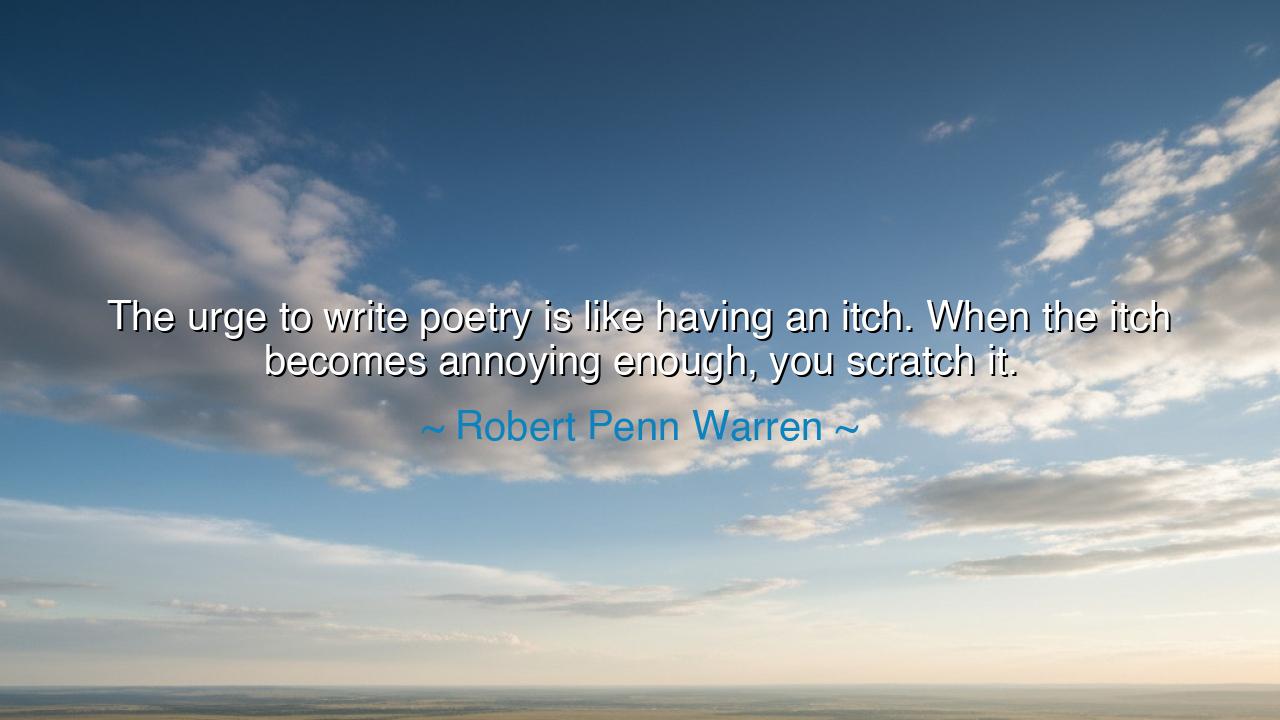
The urge to write poetry is like having an itch. When the itch
The urge to write poetry is like having an itch. When the itch becomes annoying enough, you scratch it.






“The urge to write poetry is like having an itch. When the itch becomes annoying enough, you scratch it.” So declares Robert Penn Warren, poet, novelist, and seeker of the human condition. In these words, he strips away grandeur and speaks plainly, yet with the weight of truth. The calling to write is not always lofty or divine—it is visceral, insistent, like an itch beneath the skin of the soul. It demands attention, and until it is answered, the spirit knows no peace.
The meaning of this saying lies in the nature of creative compulsion. To many, poetry may appear as a refined art, carefully constructed in quiet study. But to the poet, it is often less a choice and more a necessity. The itch of unwritten thought, of unspoken feeling, grows restless within, pressing until it bursts into words. Writing is the scratching that relieves the tension, the act that transforms the gnawing restlessness of spirit into clarity and release. Without it, the poet suffers; with it, the poet breathes again.
Consider the life of Emily Dickinson, who, though she lived much of her life in seclusion, wrote nearly two thousand poems. She did not seek fame, nor did she write for applause. Instead, her verses poured forth like the scratching of Warren’s itch—a necessity, not a performance. She confessed her inner restlessness to paper, and though the world saw little of her work in her lifetime, her scratching preserved a vision that continues to move us today. Her silence outwardly belied the ceaseless itch that poetry relieved within.
The origin of Warren’s metaphor lies also in his own practice. A man of letters, he carried the burden of being both a thinker and a feeler. His novels sought to explain power, politics, and morality; his poems sought to reveal the subtler tremors of the heart. For him, writing was never a luxury. It was medicine. It was the only way to soothe the persistent unrest of thought and feeling. The itch was his lifelong companion, urging him to create until his final days.
The lesson for us is clear: honor the itch within. Each of us carries a restlessness—perhaps not to write poetry, but to sing, to paint, to build, to speak, to dance. When ignored, it festers, becoming frustration or sorrow. When answered, it becomes creation, healing, and joy. Do not dismiss it as trivial. That small irritation in your soul may be the whisper of your deepest calling, urging you toward expression and fulfillment.
History gives us the example of Vincent van Gogh, who, though tormented in spirit, painted with relentless passion. The itch of vision drove him; he scratched it with brushstrokes of fire and color. Though unrecognized in his time, his work became balm for generations after him. His story shows that the scratching may not bring worldly reward, but it brings the necessary relief of the spirit, and through that, a gift to the world.
Thus, let us practice attentiveness. When the itch arises, do not bury it beneath distraction. Write the poem, draw the picture, sing the song, even if no one applauds. For the act itself is healing, the scratching itself a kind of salvation. And who knows? The relief you find may become, for others, the comfort they too have sought. This is the hidden power of art—that what begins as an itch within one soul may soothe countless others.
So the teaching endures: poetry, like scratching an itch, is not about glory but about necessity. When the urge rises, heed it. Relieve the restlessness of your spirit, and in doing so, you may find both your own healing and a gift for the world. For the itch unheeded becomes torment, but the itch transformed becomes art.






TTThanh Truc Tran
This makes me question the role of compulsion versus choice in artistic creation. If writing poetry is scratching an itch, does it diminish the intentionality or discipline involved in crafting a poem? I also wonder how this metaphor aligns with the experience of professional writers versus casual ones. Are the itches more frequent, more urgent, or more nuanced for those who live by words, and does this affect how they approach inspiration, structure, and revision in their work?
TVTrinh Vu
I feel a strong resonance with this idea, as it frames writing as a deeply personal and physical need. Does the metaphor also imply a sense of relief or satisfaction once the itch is scratched? I wonder whether the intensity of the itch correlates with the quality or depth of the poetry produced. Could writers who resist scratching their creative itches be missing opportunities for authentic expression, or is there value in letting the itch simmer and evolve before acting?
NMNgoc Mai
Reading this makes me reflect on the tension between inspiration and procrastination. Is the itch always persistent, or does it fluctuate depending on mood, environment, or life events? I’m curious whether Warren implies that writing is primarily reactive, scratching the itch as it arises, rather than a disciplined, planned craft. Could this suggest that true creativity is inherently spontaneous, and that waiting too long risks losing the urgency or authenticity that drives meaningful poetry?
CNchau nguyen
I find this metaphor both humorous and insightful. It makes me wonder about the nature of creative compulsion—are writers driven by an internal discomfort that demands expression? Does this mean that poetry is less a choice and more an inevitability for those who feel the itch? I also think about the universality of this feeling across different forms of art. Do painters, musicians, or novelists experience similar itches, and how do they decide when and how to act on them?